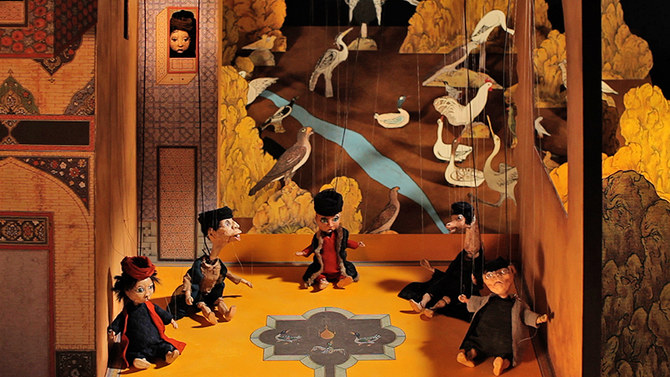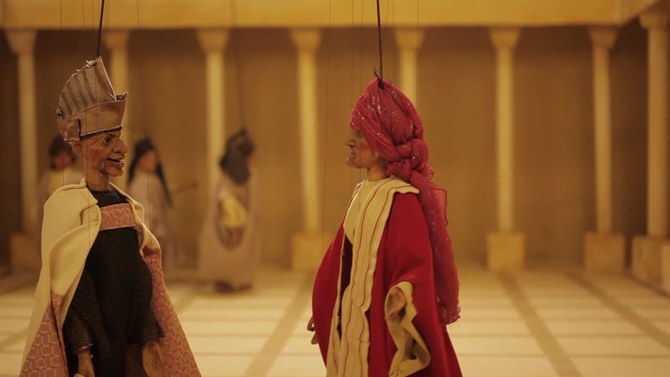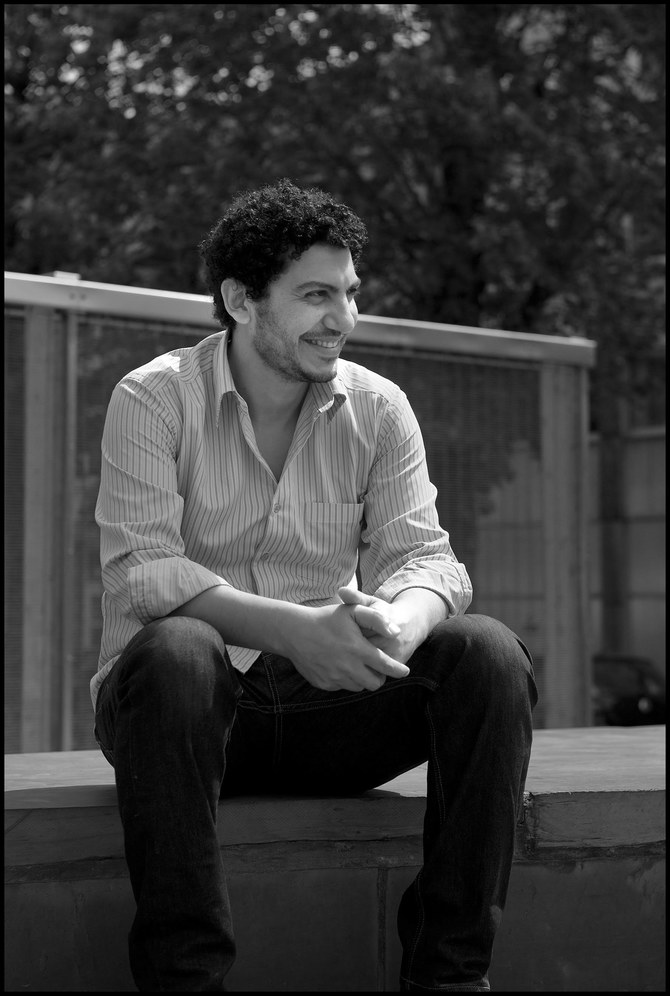LAHORE: One of the Middle East’s most celebrated contemporary artists, who recently showcased at the much talked about desert X AlUla’s inaugural art biennale in Saudi Arabia, Wael Shawky, brought his extraordinary work to Pakistan for the first time at the Lahore Biennale-- on display between Jan. 26 to Feb. 29.
Shawky’s spectacular ‘Cabaret Crusades’ installation along the walkways of the Lahore Fort Summer Palace draws on site-specific constructions and videos, playfully harnessing the boundaries between history and storytelling. This is the first time a platform for this kind of cross-cultural dialogue has been created by showcasing an internationally acclaimed artist in the backdrop of a local historical landmark.
“The summer palace was a gift,” Shawky told Arab News on Saturday.
“It’s incredible to see a Muslim city with a long history of transitions and transformations. (Lahore possesses) complexity that may be difficult to see in other Muslim Arab cities. At the same time, Lahore’s culture plays a big role in the Arab Gulf contemporary cities like Dubai, Abu Dhabi, Doha, Kuwait...” he added.
Pakistan is not new to the Egyptian artist, who gained recognition when he gave a voice to Pakistani workers in the UAE through his award-winning musical project ‘Dictums 10:120,’ originally performed for the 2013 Sharjah Biennial.
After attending the 10th Sharjah Biennale in 2011, Shawky realized that there was an unintentional disconnect-- the majority of the South Asian workforce employed in setting up the event was missing at the public events.
Therefore he came up with the idea of an artwork to highlight their cultural roots; a project that eventually took him to Pakistan’s southern city of Karachi. After a series of workshops held in Sharjah over two years, translating fragments of curatorial talks from an earlier bienniale into Urdu, and asking workers to sift through the language for meaningful phrases- the output was eventually translated into an Urdu qawwali with the help of renowned professional Pakistani qawwals, Fareed Ayaz and Abu Muhammad.
This sound piece, which examined the relationship between arts establishments and local communities, stems from Shawky’s belief that the main purpose of biennales is to bridge the gap between the local community and contemporary art.
“Working with Farid Ayyaz and Abu Muhammad was so special, it was a way to give a huge Pakistani community in UAE a voice and a dominancy over and inside art institution,” Shawky said.
“The reaction was big and positive, I think it was one of the most successful performances I have ever done,” he said.
As for his work at the Lahore Biennale 2020, Shawky uses his filming of puppet-theater to tell the story of the Crusades. In his film series Cabaret Crusades, based on a book by the French-Lebanese writer Amin Maalouf, the story of the war is told from an Arab perspective. In 2011, the first part of the trilogy, The Horror Show File (2010), made Shawky famous overnight.
A large cluster of master professionals, from native classical singers, craftsmen, and puppeteers to a full film crew, crafted these intelligible videos on elaborate sets. The magnificent, handcrafted puppets are more than enough to hypnotize the viewer emotionally and intellectually.
The hundreds of Arabic speaking puppets are clad in sumptuously oriental clothing: embroidered capes, velvet corsets or metal armor. Shawky uses a bizarre mixture of the medieval and science fiction. Puppet theater is a popular art form in Pakistan as well, but a film made from this art as opposed to a live theater show, enthralled the audience.
Each video uses different puppets and a new approach, but overall the effect is dance-like, the camera movement invigorating, the sound wisely minimal, and the songs captivating. With each successive video, Shawky expertly juxtaposes historical narrative with the childlike world of puppetry, solemnity with gullibility, terror with humor, horror with entertainment, to emphasize events that were crucial to the development of an Arab Muslim identity. Shawky does not present Arabs as victims but as active players responsible for their fate.
“In Lahore, the audience were also celebrating Cabaret Crusades, I think mainly, because I care about details and I work a lot with historical Indian miniatures as a base for my film scenography,” Shawky said.
The artist’s ambitious, multilayered film renditions look at the ways in which history and folklores are recorded, highlighting the unreliability of cultural memory, while offering critical evaluations on our current narratives of uncertainty and change.
At first sight, the videos seem like a history lesson for children, but the project eventually raises essential questions about the history of identity and consequently the role of history itself. In his words, Shawky makes a critical attempt “to translate this experience as a society that lives on their ancestor’s history.”
As with all of Shawky’s work, these hauntingly beautiful videos navigate the territory between truth and myth to raise questions about history, culture and the effect of globalization on contemporary societies.
Arab artist Wael Shawky retells history at Lahore Biennale
https://arab.news/ntj6a
Arab artist Wael Shawky retells history at Lahore Biennale

- Shawky uses his filming of puppet-theater to tell the story of the Crusades in video installations at the Lahore Fort
- Says Lahore’s culture plays big role in Arab Gulf cities like Dubai, Abu Dhabi and Kuwait
Pakistan stocks, rupee plunge as investors react to US strikes on Iran

- Benchmark KSE-10 Index dropped more than 3 percent to the lowest in over six weeks
- Analysts say if there was no further escalation, value buying is expected to come through
KARACHI: Pakistan’s stocks and currency markets tumbled on Monday as investors reacted to the United States’ (US) foray into the Israel-Iran conflict, traders and analysts said.
The benchmark KSE-100 index dropped more than 3 percent to 116,167 points, the lowest in more than six weeks, while the rupee continued to weaken against the US dollar in the seventh consecutive session on Monday.
The index has plunged by nearly 5 percent since June 13 when Israel first hit Iranian military and nuclear targets in Natanz, Isfahan and Fordow, killing top generals and scientists among 78 people.
“Rising geopolitical tensions following a US strike on Iran shook investor confidence, causing the KSE-100 Index to drop by 3.2 percent,” Mohammad Waqas Ghani, head of research at JS Global Capital Ltd., told Arab News, adding that this was the fourth largest single-day decline in terms of points historically.
The attacks on Iran by the US, which followed Israeli strikes, have intensified the war and deepened geopolitical tensions in the Middle East, sending jitters to markets across the globe.
Monday’s 3.2 percent fall was the worst since May 8 when the index had plunged 5.9 percent day-on-day, according to Ghani.
“The spike in global oil prices has further intensified concerns about Pakistan’s external account vulnerabilities,” he added.
Cash-strapped Pakistan, which is trying to revive its debt-ridden economy with the help of International Monetary Fund’s $7 billion program, spent $17 billion on oil imports last year.
Raza Jafri, head of research at Intermarket Securities Ltd., attributed the day’s fall to redemptions at mutual funds and possible margin calls.
“Regional tensions are the main reason behind the weak sentiment,” he said, adding that if there was no further escalation, the value buying was expected to come through.
RUPEE DROP
The ongoing tensions have also impacted the Pakistani currency that lost another 0.06 percent as the greenback closed at Rs283.87, according to State Bank of Pakistan (SBP) data.
The rupee is constantly falling and has devalued 0.3 percent since the start of Iran-Israel conflict.
“The rupee is feeling the heat of this war, very negligibly though,” Zafar Paracha, secretary-general of the Exchange Companies Association of Pakistan, told Arab News.
“This stability in the exchange rate reflects the overall macroeconomic stability the country has achieved.”
Pakistan’s top security body backs Iran’s right to self-defense after US, Israeli strikes

- Pakistan, Russia and China have called for a ceasefire after the strikes raised fears of a wider conflict in an already volatile region
- Experts say Pakistan, which shares border with Iran, will face additional security and economic challenges due to the worsening conflict
ISLAMABAD: Pakistan’s National Security Committee (NSC), which comprises top civilian and military leaders, has reaffirmed its support for Iran’s right to self-defense, Prime Minister Shehbaz Sharif’s office said on Monday, after United States and Israeli strikes on Iran.
The statement came a day after US attacks on three Iranian nuclear sites, joining Israel in the biggest Western military action against the Islamic Republic since its 1979 revolution.
As the strikes raised fears of a wider conflict in the already volatile region, Russia, China and Pakistan have urged the United Nations Security Council to adopt a resolution calling for an immediate and unconditional ceasefire in the Middle East.
On Monday, Pakistan PM Sharif presided over an NSC meeting to review the evolving regional situation and condemned Israeli attacks on Iran, which it said coincided with a constructive negotiation process between Iran and the United States.
“These reckless actions have escalated tensions, threatening to ignite a wider conflict and diminishing the opportunities for dialogue and diplomacy,” Sharif’s office said in a statement after the meeting.
“The NSC reaffirmed Iran’s right to self-defense as enshrined in the UN Charter.”
The NSC expressed grave concern over the potential for further escalation after the attacks on Iranian nuclear facilities in Fordow, Natanz and Isfahan by the US, reiterating that they violated the resolutions of the International Atomic Energy Agency (IAEA), relevant international law, and the UN Charter.
The forum reaffirmed Pakistan’s readiness to continue efforts to promote regional peace and stability and called on all parties to resolve the conflict through dialogue and diplomacy.
Tensions between Tehran and Tel Aviv initially flared on June 13 when Israel launched airstrikes against what it described as Iran’s military leadership and nuclear infrastructure. Both sides traded missiles on Monday in fresh strikes.
In a separate development, Pakistan PM Sharif spoke with Iranian President Masoud Pezeshkian on Monday afternoon — their second telephonic call in less than 48 hours.
“The Prime Minister conveyed Pakistan’s condemnation of the US attacks, which followed Israel’s unprovoked and unjustified aggression,” Sharif’s office said. “He reaffirmed Pakistan’s unwavering solidarity with the brotherly people and Government of Iran.”
The prime minister expressed concerns that the US strikes had targeted Iranian facilities that were under the safeguards of the International Atomic Energy Agency (IAEA), constituting a “serious violation of international law and the IAEA Statute.”
“While noting Iran’s right to self-defense, as enshrined under Article 51 of the UN Charter, the Prime Minister stressed upon the need to immediately return to dialogue and diplomacy as the only viable path forward,” the statement read. “He also called for urgent collective efforts to de-escalate the situation.”
Earlier on Monday, Pakistan’s UN Ambassador Asim Iftikhar Ahmad called on the Security Council to act “urgently and decisively,” warning against the danger posed to the populations of the region as the war intensifies.
Experts warn Pakistan, which shares a 900-kilometer porous border with Iran in its southwestern region prone to separatist militancy and cross-border attacks, will face additional security and economic challenges due to the worsening conflict between Tehran and Tel Aviv.
Surging global oil prices due to the worsening conflict will cause economic setbacks for Pakistan, which relies on expensive fuel imports for its energy demands, according to financial analysts. Islamabad is already grappling with a macroeconomic crisis amid a precarious balance of payment position.
The crisis also raises questions about how Islamabad will navigate its delicate balancing act between Iran, other Gulf partners, and the US, which remains one of Pakistan’s largest trading partners and a critical source of military and economic assistance.
Pakistan cuts 50 percent export charges at major port to boost trade, economic growth

- The reduction in charges at Port Qasim is part of government reforms to enhance trade facilitation
- Pakistan plans to establish an industrial zone to promote marine, aquaculture sectors, minister says
KARACHI: The Pakistani government has reduced port charges for exporters by 50 percent at the country’s second biggest Port Qasim, the Pakistani maritime affairs ministry said on Monday, amid efforts to boost trade and economic growth.
The development came after a strategic roadmap meeting of the ministry, at which Maritime Affairs Minister Junaid Anwar Chaudhry emphasized the government’s commitment to creating opportunities for local businesses and encouraging trade through ports and fisheries.
Pakistan is striving to boost trade and investment amid a gradually healing macroeconomic environment after a prolonged downturn that forced Islamabad to seek external financing from friendly nations and multiple loan programs with the International Monetary Fund (IMF).
“The government’s reform agenda in the maritime sector, including the charge reduction at Port Qasim, signals a strong commitment to supporting the business community, enhancing trade facilitation, and promoting economic development across coastal regions,” he was quoted as saying.
Officials briefed the participants that the Marine Fisheries Department had met its export target of $410 million this fiscal year through fisheries and aquaculture exports, according to the maritime ministry. Additionally, the ship recycling industry had generated a revenue of Rs6 billion ($21.1 million), reflecting the growing potential of maritime industries in the country.
Chaudhry said the government is focused on modernizing port infrastructure, streamlining customs operations, and fostering a business-friendly environment to enhance Pakistan’s competitiveness in international trade.
“The Ministry of Maritime Affairs is actively working on reforms to unlock the economic potential of vast coastline and maritime resources,” he said. “These efforts are part of a broader strategy to transform the maritime sector, boost exports, and contribute significantly to the country’s GDP.”
He announced his ministry’s plans to establish an Aquaculture Industrial Zone aimed at promoting business activities in the marine and aquaculture sectors.
“Pakistan’s first-ever Marine and Aquaculture Policy will be introduced soon to provide a comprehensive framework for sustainable development in these areas,” he said.
Share Indus water fairly or Islamabad will secure it ‘from all six rivers,’ Pakistan ex-FM tells India

- The statement comes days after Indian minister said ‘Pakistan will be starved of water’
- Islamabad previously said any blocking of its water would be considered ‘an act of war’
ISLAMABAD: Former Pakistani foreign minister Bilawal Bhutto-Zardari on Monday asked India to share the Indus water fairly or Islamabad will secure it “from all six rivers.”
The statement came days after Indian interior minister Amit Shah said New Delhi will “never” reinstate the Indus Waters Treaty (IWT) it suspended with Pakistan over an attack in India-administered Kashmir. India accused Pakistan of backing the assault, a charge denied by Islamabad and one which was followed by four-day military standoff between the two countries last month.
The IWT grants Pakistan rights to the Indus basin’s western rivers — Indus, Jhelum, and Chenab — for irrigation, drinking, and non-consumptive uses like hydropower, while India controls the eastern rivers — Ravi, Beas, and Sutlej — for unrestricted use but must not significantly alter their flow. India can use the western rivers for limited purposes such as power generation and irrigation, without storing or diverting large volumes, according to the agreement.
A day after the Kashmir attack that killed 26 tourists, New Delhi announced it was putting the 1960 World Bank-mediated treaty, which ensures water for 80 percent of Pakistani farms, in abeyance. Pakistan has previously said the treaty has no provision for one side to unilaterally pull back and that any blocking of river water flowing to Pakistan will be considered “an act of war.”
“India has two options: share water fairly or we will deliver water to us from all six rivers [of the Indus basin],” Bhutto-Zardari said, while addressing the lower house of Pakistan parliament.
“The attack on Sindhu [Indus river] and India’s claim that the IWT has ended and it’s in abeyance, firstly, this is illegal, as the IWT is not in abeyance, it is binding on Pakistan and India but the threat itself of stopping water is illegal according to the UN charter.”
The former foreign minister, who recently led a diplomatic mission to key world capitals to present Pakistan’s stance on the latest crisis with India, said Islamabad had defeated New Delhi on the “battlefield, in diplomacy, and in the war of narratives.”
On Saturday, Indian interior minister Shah said they would take the water that was flowing to Pakistan to the Indian state of Rajasthan by constructing a canal
“Pakistan will be starved of water that it has been getting unjustifiably,” he told Times of India newspaper.
The latest comments from Shah, the most powerful cabinet minister in Prime Minister Narendra Modi’s cabinet, have dimmed Islamabad’s hopes for negotiations on the treaty in the near term.
Halting the water agreement was one of a series of tit-for-tat diplomatic measures taken by both countries in the immediate aftermath of the April 22 attack in Kashmir. Islamabad is also exploring a legal challenge to India’s decision to hold the treaty in abeyance under international law.
New Delhi has not made public any evidence of Islamabad’s alleged involvement in the Kashmir assault. During the four days of fighting which followed in May, more than 70 people were killed in missile, drone and artillery fire. It was the worst standoff between the nuclear-armed neighbors since 1999.
A room of one’s own: Women claim men-only ‘Autaq’ community spaces in Pakistan’s Balochistan

- Autaq is a communal space in Sindh and Balochistan provinces where male guests gather, decisions are made, and dialogue takes place
- In province marked by poverty and patriarchal norms, emergence of women’s Autaqs signals rare and radical shift in reclaiming public space
LASBELA, Pakistan: On a summer afternoon in the village of Ahmadabad Wang village in southwestern Pakistan this month, the sun filtered through the wooden slats of a modest building tucked between fields and dusty open lands.
Inside, the sharp scent of chalk and fabric mixed with the low hum of women’s voices.
Here, on a carpeted floor lined with checkered rugs and cylindrical pillows, women and girls had gathered not to cook or clean or care but to talk: about reproductive health, about puberty. About what they wanted from life and the future.
And they are doing it in an Autaq, a space that for generations has been the exclusive domain of men in the southern Sindh province and in districts of Balochistan that border Sindh, Lasbela being one of them.
“The concept of Autaq is deeply rooted in our culture, both Sindhi and Baloch,” said Hafsa Qadir, 22, a sociology graduate who helped found this women-only version in December last year.
“Here, we talk about a range of challenges — SRHR [sexual and reproductive health and rights], menstruation, hygiene and skill-based education. All those issues that we can’t talk about openly outside, we discuss them freely here.”
Growing up, Qadir had watched her male cousins gather in their Autaq, with cushions piled high and the clink of tea cups punctuating heated discussions. Girls stood at the threshold, never allowed inside.
“Usually, it serves as a community center, but only for men,” she said. “It just represents half of the community.”
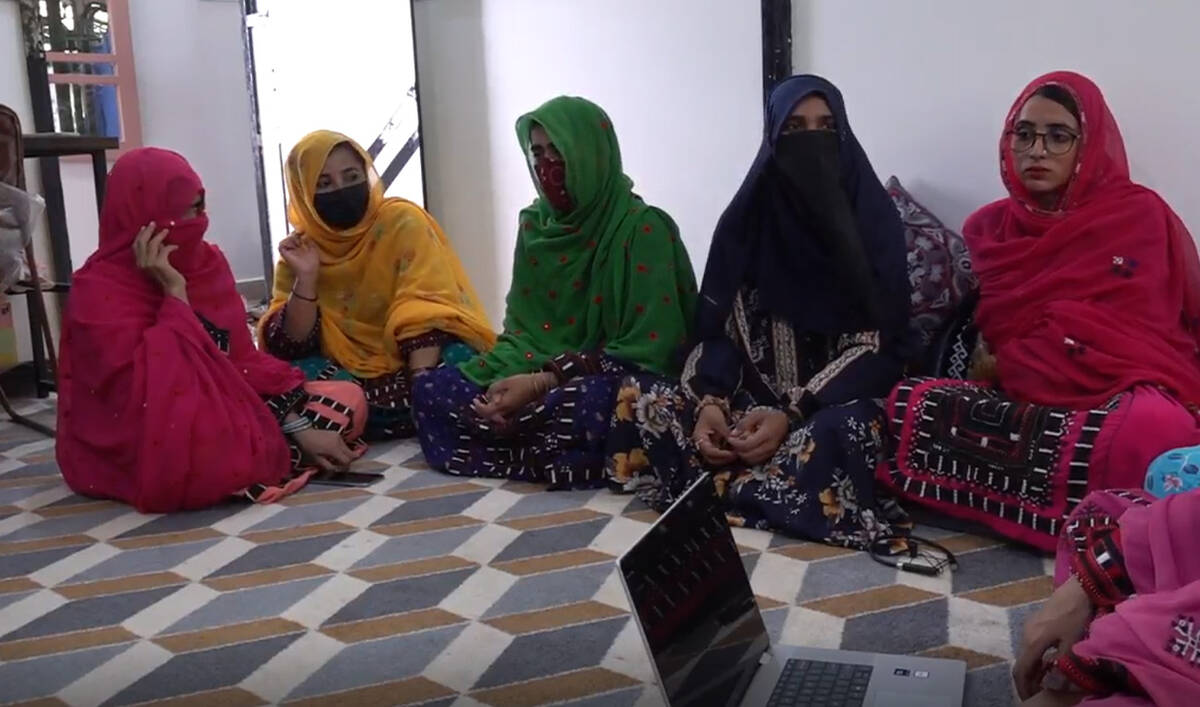
That memory stayed with her until she and six women from surrounding villages decided to build something of their own.
The Addi Autaq, laid with humble furnishings and hand-stitched cushions, now welcomes over 50 women and girls each week. Every time the women gather, the room buzzes with energy and purpose, its walls bearing witness to conversations once whispered behind closed doors.
Next to it Addi Autaq is a small stitching center where women thread needles and run fabric through clacking machines. The clothes they make are sold in local markets and for some, it’s the first time they’ve earned their own income.
“There was no place here before where we could sit and speak openly,” said Saima Kareem, a student who pays her university tuition with her earnings.
“I feel very proud that I can bear my own expenses… cover my educational expenses and help out my family as well.”
“BIG ACHIEVEMENT”
Their revolution has come with quiet persistence.
Balochistan, after all, is no easy place to be a woman. It is Pakistan’s largest province by area but also its most underserved. Female literacy stands at around 24 percent, far below the national average. Access to basic health care is limited. Many girls never complete school and few women join the workforce.
Against that landscape, the idea of women not just gathering, but leading, shaping dialogue, earning money, is almost audacious.
“When we started the Autaq, we faced many challenges,” said Tehreem Amin, 23, an environmental sciences graduate.
“We approached the elders in our families, brothers, fathers, those who were educated, and talked to them, explained our purpose, and gradually helped shift their thinking.”
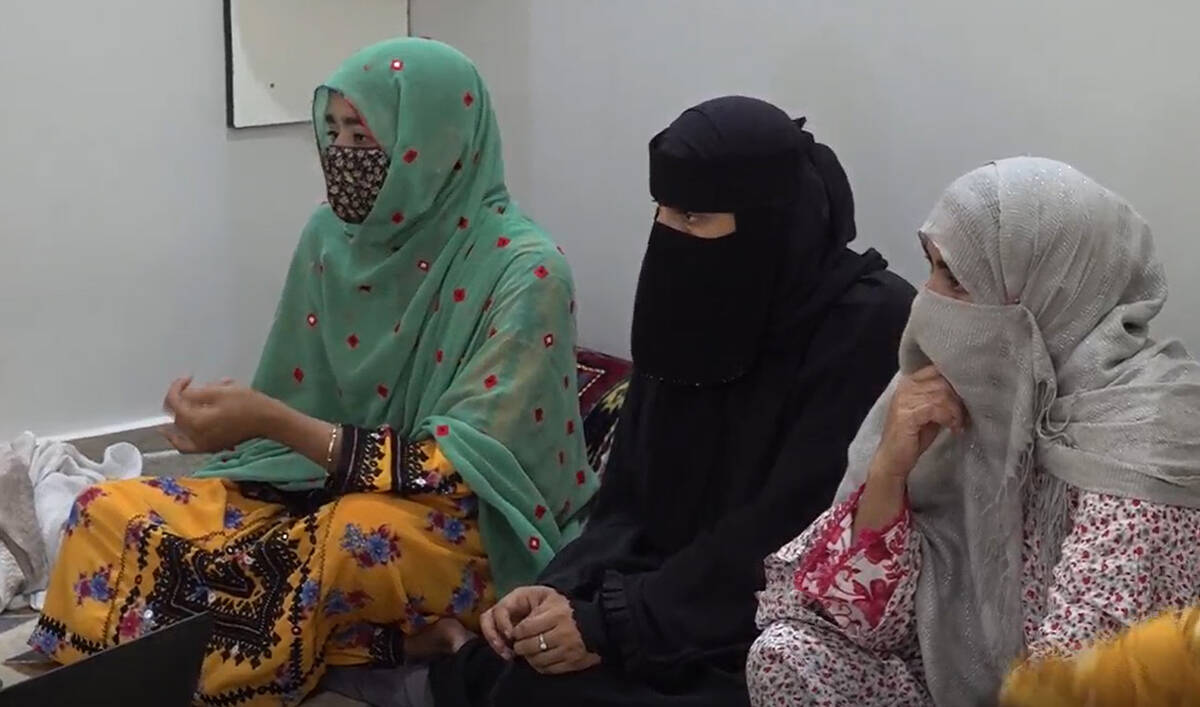
Now, once skeptical male relatives are sending their daughters to the Autaq.
“When we started our own Autaq, it had some impact… Some women [on social media] have even said they want to visit, see how we created this Autaq, how we built a space that is truly safe for women,” said Asma Ali, 24, a teacher and co-founder, as evening fell and women left the carpeted room and moved to a nearby garden.
There, in the open air, they held reading circles and dreamt aloud about education, leadership, financial independence.
“The Autaq we’ve established is a big achievement,” Amin, the environmental sciences graduate, said.
“But I believe when such Autaqs exist in every village, in every corner of Pakistan… only then will it be a real success.”




